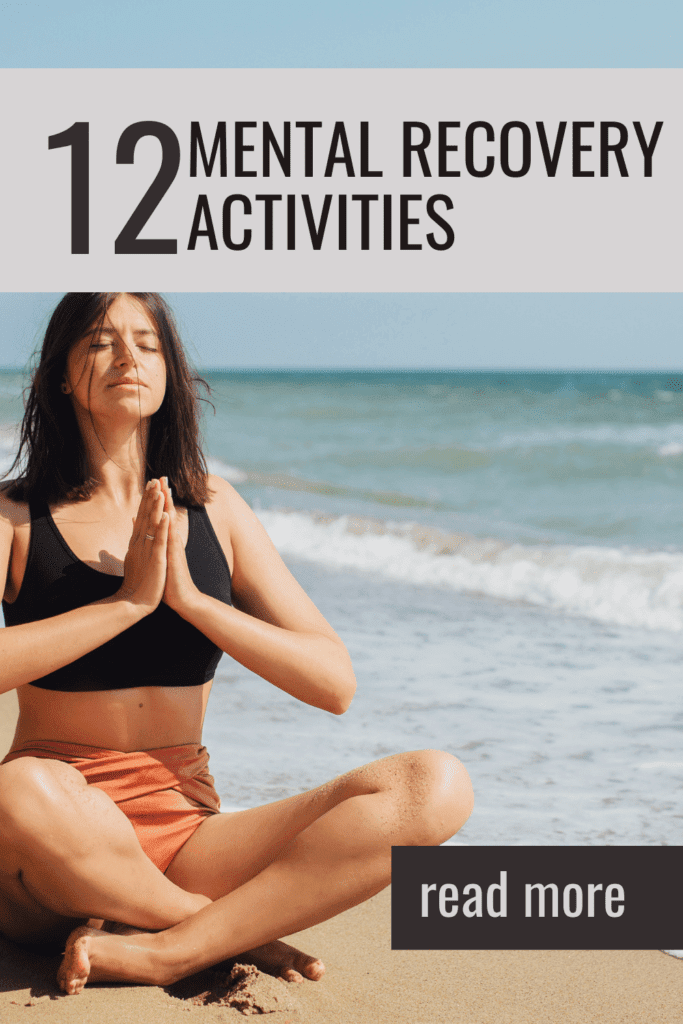This post may include affiliate links. Please read my disclaimer page for more info.
Just as physical activity is essential to our physical health, it is equally important to nurture our mental health. Have you ever considered the role mental recovery and self-care play in improving your overall well-being?
From exercise to calming mindfulness exercises, your mental well-being deserves the utmost attention and care. By adopting the activities and practices described in this article, you can prioritize your own mental recovery.
Which leads to a more balanced and satisfying life.
Why do we need mental recovery?
It is important for our mental health, as with physical activity, we need to give ourselves space for recovery.
When you give yourself time to rest, your brain has room to process new impressions, it is important for your quality of life.
Even small acts of self-care in your daily life can have a big impact.
Caring for Your Mental Health
What specific activities can help with mental recovery? There are several different ways to find mental recovery.
Physical activity
Move your body, 30 minutes is enough to have a positive effect on your mood. A little but regularly is great for health, so don’t overthink it.
How can physical activity contribute to psychological well-being?
When you move, blood flow to the brain increases, which allows new blood vessels to form and improves oxygenation.
I highly recommend The mind body method by Dr Anders Hansen if you want to read more about the impact of exercise on the brain.
This is superb for the brain and all its functions because oxygen is necessary in the brain’s energy production.
Walk in nature
Taking walks is a low-intensity physical activity that should not be underestimated. A personal favorite, getting outside, has been important in my recovery.
I find that walking brings a lot of clarity and creates room for creativity.
Yoga
Any form of physical activity is beneficial, but yoga may be worth trying if you have problems with stress.
Because yoga is a low-intensity activity that strengthens your presence in the body. You get better contact with your body and practice presence at the same time.
Weight Training
Don’t think you have to take it easy or, strength training is also a way to build contact with the body.
I experience strength training as very meditative. Full focus on one rep at a time.

Mindfulness exercises
Practicing being in the moment is great for stress management. Personally, I experience that much of my stress comes from “I should” or “I have to do these”, thoughts that are outside the present.
If you want to read more about finding yourself in the moment, I recommend The power of now by Eckahart Tolle, this book has had a great influence on my mindset around this.
What are some mindfulness practices that can help with stress management?
Most mindfulness exercises activate the parasympathetic nervous system. This part of the autonomic nervous system is responsible for relaxation in the body and is active during rest.
The parasympathetic nervous system slows down your heart rate, breathing rate, blood pressure, and other stress functions.
Meditation
Meditation can have many positive effects, including reduced stress and anxiety.
Regular meditation can also improve focus and memory. There are many different forms of meditation that you can try.
Breathing exercises
In some meditations, you adjust your breathing or focus on it to create presence. This is similar but not the same.
Focus on keeping a pattern with your breathing. Here are some examples:
- Box breathing
- Diaphragmatic breathing
- 4-7-8 Breathing
Wim hoff is probably the most famous for his breathing exercises, but can be very intense and is not recommended for someone who has never practiced this before.
Everydayhealth.com recommends different exercises you can try.
Body scan
Focus on one body part at a time. The goal is to feel it throughout the body and create presence.
This exercise usually starts with focusing on the breath and then moves the attention to one body part at a time.
From toe to top, you feel and listen to how it feels and then relax.
This is also a very good exercise for creating relaxation.
Social activities
We are all different, and sometimes it can be energizing and sometimes the worst energy thief to have a social gathering.
This is of course individual, both to you as a person and to whom you choose to hang out with.
It is important that you find activities that suit your interests and preferences.
Meet friends
It doesn’t have to be that complicated. If it is difficult to meet IRL, a zoom coffee can be a cozy alternative.
You can:
- Go out and have a coffee.
- Go to a museum
- play an online game
- Have a lunch
- Shop in town
Dinner with the family
Go out on the town and visit a cozy restaurant. The suggestion here is not necessarily to go out to eat but rather to spend quality time with your family.
When you socialize with others, the purpose is to find relaxation, distraction, and to find pleasure in each other’s company.
Local events
See if there are any events that can be fun and rewarding. Food tasting, theater or music.
Joining community organizations or visiting farmers markets can create community with those near you.

Crafts and puzzles
It can be stimulating to flex the creative brain. Start a new hobby or pick up an old one again.
Creative self-care should include fun and simple activities, and not things that can be too difficult and create stress.
Paint
Drawing or painting can be very cozy and something you don’t need to be an artist for.
Hobbies are for you and should not be so demanding. Get a coloring book with mandalas that you can color.
Sew or crochet
Learn how to make granny squares or crochet a cute little animal. There are a lot of patterns and tutorials on the web that you can learn from.
Music
Learn to play an instrument, there are lots of apps that you can use to learn to play, e.g. Piano or guitar.
Or create new music, be your own DJ and remix or create new songs. If you can read this post, a suitable program or tool is just a click away.
Why is it important to prioritize mental well-being and self-care?
The importance of mental recovery and self-care cannot be overstated. Just as physical activity is essential to your physical health, taking care of your mental well-being is essential to living a balanced life.
Engaging in mental recovery activities can have many benefits. Including reduced stress, improved mood, increased focus and improved overall mental health.
Prioritizing mental recovery and self-care is not only positive for the individual, but also affects our relationships.
It is a powerful act of self-love and self-preservation that allows us to have the energy to deal with all the must-haves and those that matter most.
